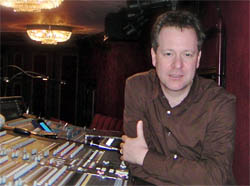
Certainly the most recent Weber production of The Sound of Music fits the bill, as does the new Palladium production of Sister Act he began work on more recently, with composer Alan Mencken. The preference, he explains, is a result of the most important strength he believes he brings to the gig – a deep love of both music and sound reinforcement.
“I think that’s my main strength,” he notes. But another key to the ongoing demand for his services is his philosophy and approach: “On every show you have to come at it fresh; being very clear on what the brief is and not falling into the trap of doing a generic sound design on any show because it’s the way you work.
“Once you talk to a creative team about the brief of what a show is, you need to prepare for every eventuality – be able to create what they want from that moment. Nobody’s going to call you and tell you what to do.”
“I try and be invisible as much as possible,” he adds. “When you’re putting on a show, nobody wants a superstar sound designer. There are enough other superstars in the theatre.”
That’s not to say he doesn’t have to go to the wall at times to get what he needs. Everybody has to at some point – the key, Potter explains, is to do so reasonably and confidently, whether it’s about getting the necessary gear and budget, bargaining for positions in the house with the set and lighting design departments, or ensuring there’s adequate time allocated for the needs of both him and the crew.
“There’s a scenic designer, a lighting designer, a choreographer, the director, the cast, the music department, and they all want the time. It’s very easy to get snowballed over, at which point you’re not going to end up delivering a good product.”
Part of delivering the best product is being relentlessly specific about his gear needs, particularly when a production goes on tour. Simple errors can have a profound and cascading negative effect.
“The mic’ing for an instrument not being right will affect the way it sounds in the house. That will affect the way it sounds on stage. Then a performer won’t be happy and the mix will go out of balance and someone will try to fix it in the wrong place, which then makes it worse. You have to be specific at all times.”
He generally specifies Meyer Sound and d&b audiotechnik loudspeakers for his designs. He was also an early proponent of digital technology, seeing a net benefit in terms of flexibility and programability immediately, and he still regularly specifies a Yamaha PM1D digital console for his shows.
Having said that, an upcoming project may prompt him to explore other avenues in terms of the technology he’s most familiar with. Updating the gear package for the upcoming Weber sequel to Phantom, Love Never Dies in a similar manner to what he’d done previously for later incarnations of Cats and the original Phantom.
Gear and process aside, Potter’s favorite moment of the job comes only after putting months of work into a gig. “When we put the orchestra in the pit and it turns into a musical,” he concludes. “When it finally becomes the thing everybody’s been working on.”
Based in Toronto, Kevin Young is a freelance music and tech writer, professional musician and composer.
